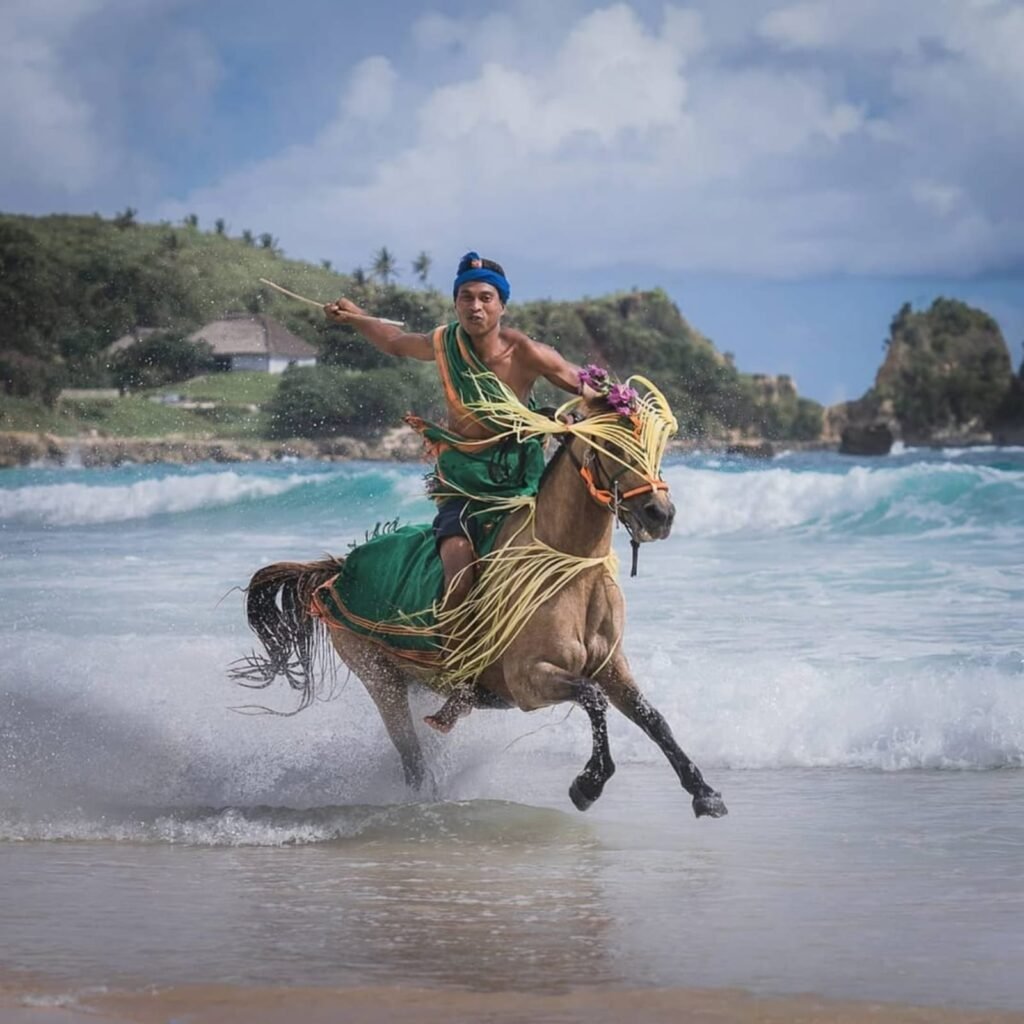Introduction to Sumba
Sumba Tour Packages-Sumba is a captivating island located in the East Nusa Tenggara province of Indonesia, lying approximately 400 kilometers southeast of Bali. This enchanting destination is known for its unique geographical features, including dramatically rugged landscapes, pristine beaches, and verdant hills that provide stunning backdrops for any traveler. Sumba’s diverse topography not only enhances its natural beauty but also makes it an ideal locale for various adventurous activities, catering to those seeking both relaxation and adventure.
Culturally, Sumba is rich in traditions that are deeply integrated into the daily lives of its inhabitants. The island is home to the Sumbanese people, who are known for their traditional ceremonies, distinctive weavings, and the impressive megalithic tombs that reflect a rich heritage. The local customs and practices, including intricate rituals and festivals, offer an inviting glimpse into a world that remains largely untouched by modern influences. For culture enthusiasts, participating in or witnessing these customs provides a profound opportunity for immersion and understanding of this unique way of life.
Moreover, Sumba is renowned for its breathtaking natural attractions. Its stunning beaches, such as Weekuri Lagoon and Pasir Pulu Beach, draw visitors keen on relaxation as well as water sports like surfing and snorkeling. The island’s internal beauty is equally impressive, with hills and waterfalls attracting trekkers and nature lovers alike. Such features contribute to Sumba’s reputation as a sought-after destination, appealing to those who wish to explore a harmonious blend of adventure and cultural depth. Whether travelers are interested in architecture, nature, or indigenous culture, Sumba offers a unique experience that stands apart from more conventional tourist locales.
Why Choose a Sumba Tour Package?
Choosing a tour package for your Sumba adventure can significantly enhance your travel experience. One of the primary benefits of opting for a tour package is the convenience it offers. When you book a package, most of the logistics, including accommodations, transportation, and itinerary planning, are managed for you. This allows you to focus on immersing yourself in the rich culture and breathtaking landscapes that Sumba has to offer. There is no need to spend time on intricate scheduling, as everything is curated to make your journey seamless and enjoyable.
Another advantage of utilizing a Sumba tour package is cost-effectiveness. Tour operators often have established relationships with local businesses, which can lead to discounted rates for accommodations, tours, and activities. This means that travelers can enjoy a wide range of experiences without overstretching their budgets. Moreover, a package typically includes meals and guided tours, which can offer additional savings compared to independent travel, where costs can accumulate quickly.
Guided tours also provide unique cultural experiences that may be difficult to access when traveling alone. Local guides not only navigate the terrain but also share invaluable insights about Sumba’s customs, traditions, and history. This connection to local culture can transform your visit from a mere sightseeing trip to a deeply enriching experience. Furthermore, safety is enhanced when traveling with a tour group, as guides are familiar with local conditions, which can be particularly beneficial in remote areas.
For those seeking tailored experiences, many tour packages are customizable to fit individual preferences, allowing travelers to engage in activities that resonate most with them. Whether it’s exploring traditional villages, hiking scenic trails, or participating in cultural ceremonies, a Sumba tour package affords options that align with your interests while ensuring a memorable journey.
What to Expect in a Sumba Tour Package
When embarking on a Sumba tour, travelers can anticipate a well-rounded package that showcases the island’s breathtaking landscapes, rich culture, and unique experiences. Typically, a Sumba tour package includes several key components: accommodations, transportation, meals, sightseeing activities, and cultural experiences. Each of these elements contributes to an enriching travel experience that caters to varying preferences and interests.
Accommodations vary from luxurious resorts to more rustic lodgings, ensuring options that appeal to different budgets and tastes. Many packages may feature beachfront villas or traditional homestays that allow visitors to immerse themselves in the local culture. The flexibility of these options means you can choose a setting that resonates with your desire for comfort or cultural authenticity.
Transportation is another critical aspect of a Sumba tour package. Most providers include transfers from the airport to your accommodations, as well as local transportation for excursions. This aspect is particularly valuable in Sumba, as navigating the island’s diverse terrains often requires a reliable mode of transport. Guided tours via comfortable vehicles or even traditional methods like horse riding add an authentic layer to the travel experience.
Meals are commonly included within tour packages, offering opportunities to savor local cuisine that highlights the ingredients and flavors unique to Sumba. Travelers might enjoy traditional dishes made from locally-sourced produce, thus enhancing their culinary experience. Furthermore, packages often encompass various sightseeing activities that allow exploration of the island’s stunning beaches, undulating hills, and ancient megaliths, fostering a deep appreciation for Sumba’s natural beauty and historical significance.
Cultural experiences are an essential part of any Sumba tour. Visitors can engage with the local community, participate in traditional ceremonies, and explore artisan crafts, enabling a deeper understanding of Sumba’s diverse heritage. Overall, Sumba tour packages are designed with the traveler in mind, offering flexibility and numerous options that can cater to individual preferences for a personalized journey through this enchanting island.
Top Activities to Enjoy in Sumba
Visiting Sumba offers a plethora of activities that highlight both adventure and cultural richness. One of the foremost pursuits is surfing, as the island is renowned for its picturesque beaches and excellent waves. Places like Nihiwatu Beach attract surfers from around the world, providing an ideal setting for both beginners and experienced surfers to hone their skills. The surfing conditions, especially during the dry season, are often considered some of the best in Indonesia.
Trekking is another popular activity that allows visitors to explore the island’s breathtaking landscapes. The diverse topography of Sumba, ranging from hills to coastal terrains, offers various trekking routes. Notably, the Wanokaka Valley presents an appealing option for trekking enthusiasts, featuring stunning sunsets and panoramic views. Trekking here not only allows for physical activity but also provides an opportunity to witness the vibrant flora and fauna unique to the region.
Moreover, engaging in traditional ceremonies is a culturally enriching experience that should not be missed. Sumba is home to unique customs, such as the Pasola festival, which is a traditional warfare ritual held annually. This ceremony not only showcases the bravery and skill of local horsemen but also serves to reinforce community bonds. Visitors can witness this colorful event, gaining insight into the island’s rich heritage.
Lastly, exploring local markets is an essential part of experiencing Sumba’s culture. Markets are often bustling hubs of activity where visitors can interact with locals and discover handmade crafts, traditional textiles, and fresh produce. Shopping at these markets allows tourists to take home a piece of Sumba, while also supporting local artisans and contributing to the economy.
Best Times to Visit Sumba
When planning a visit to Sumba, one of Indonesia’s enchanting islands, understanding the best times to go is crucial for maximizing the travel experience. The climate, local festivals, and peak tourist seasons play significant roles in determining the ideal time for your journey. Generally, the dry season, spanning from April to October, is considered the best time to explore Sumba. During these months, visitors can expect minimal rainfall, pleasant temperatures, and optimal conditions for outdoor activities such as hiking, beach visits, and cultural excursions.
Within this dry season, the peak months for tourism typically occur from June to September. While these months offer favorable weather, they also attract larger crowds, meaning travelers should plan their accommodations and itineraries well in advance. Engaging in local festivals can also enrich your experience while visiting Sumba. Notably, the Pasola Festival, which takes place in February or March, where local warriors engage in traditional horseback battles, showcases the island’s vibrant culture and is a captivating event for tourists. Participating in such festivities provides unique insights into the rich traditions and local customs.
Travelers should also consider the shoulder months—April and November—where the weather is still favorable, but tourist numbers dwindle. This time can be ideal for those seeking a quieter experience, offering better opportunities for personal interactions with locals and exploring Sumba’s breathtaking landscapes without the hustle and bustle. Ultimately, the best time to visit Sumba depends on personal preferences, whether seeking a lively atmosphere with numerous events or a tranquil escape into the island’s natural beauty.
Choosing the Right Sumba Tour Package
When selecting a Sumba tour package, it is essential to consider your personal interests and travel preferences. Sumba, known for its stunning landscapes and rich cultural heritage, offers a variety of tour packages that cater to different types of travelers. To begin with, assess whether you are seeking adventure, relaxation, or cultural immersion. Each package varies significantly in terms of activities offered, and aligning these with your interests is crucial for an enjoyable experience.
Next, comparing different Sumba tour packages can provide insight into what to expect from your trip. Look for details such as duration, destinations included, and the type of accommodation offered. Packages that emphasize outdoor activities may include trekking or surfing opportunities, whereas those focused on cultural experiences might feature village tours or traditional ceremonies. Ensuring that the itinerary reflects your expectations is vital in choosing the right package.
Reviews from past travelers can serve as invaluable resources during your selection process. Websites that aggregate customer experiences often highlight the strengths and weaknesses of specific tour providers. Pay attention to comments regarding the quality of guides, transportation, and overall value for money. This feedback can help inform your decision and provide realistic expectations for your trip to Sumba.
Additionally, be mindful of the local culture and customs. Some packages incorporate community interactions that allow for deeper engagement with Sumba’s unique traditions. Confirm that these experiences resonate with your interests in cultural exploration. Ultimately, by thoroughly researching and carefully comparing your options, you can ensure that the Sumba tour package you choose aligns perfectly with your expectations for an adventurous and enriching journey.
Sustainable Travel: Responsible Tourism in Sumba
As tourism in Sumba continues to develop, it is crucial to emphasize the importance of sustainable travel practices to preserve the unique cultural heritage and natural environment of the island. Responsible tourism not only enhances the travel experience but also contributes positively to local communities. To engage in sustainable travel during your visit to Sumba, it is essential to be aware of the potential impact of your presence.
One significant aspect of sustainable tourism in Sumba is minimizing environmental footprints. Travelers can adopt eco-friendly practices such as reducing waste, conserving water, and choosing sustainable transportation options. By opting for local guides and businesses, visitors can ensure that their spending directly benefits the community. Supporting locally-owned accommodations, restaurants, and artisans promotes sustainable economic growth while allowing travelers to gain authentic insights into Sumbanese culture and traditions.
Engaging in responsible tourism also involves respecting local customs and traditions. Sumba is home to diverse ethnic groups, each with its own beliefs and practices. Familiarizing oneself with local etiquette can enhance interactions and demonstrate appreciation for the rich cultural tapestry of the island. Furthermore, being mindful of sacred sites and natural wonders, such as avoiding littering or damaging flora and fauna, reflects a commitment to preserving Sumba’s pristine environment.
Additionally, travelers can participate in initiatives aimed at conservation and community improvement. Many organizations facilitate volunteer opportunities that enable visitors to contribute positively to local challenges, such as environmental degradation or educational needs. By involving oneself in such activities, individuals can leave a lasting impact long after their visit.
In summary, sustainable travel in Sumba is essential for safeguarding the island’s environment and cultural integrity. By committing to responsible tourism practices, travelers can ensure that their adventures create lasting benefits for both the visitors and the communities they engage with.
Local Cuisine: A Taste of Sumba
Sumba, an island marked by its vibrant culture and natural beauty, also offers a rich culinary landscape that reflects its heritage and local resources. Traditional Sumbanese cuisine showcases a variety of ingredients native to the region, and indulging in these dishes may serve as a gateway to understanding the island’s culture. The island’s remote location contributes to its unique culinary offerings, with many dishes emphasizing locally sourced produce, meats, and spices.
One of the most iconic dishes is the Sumbanese grilled pork, often marinated with a blend of aromatic spices before being cooked over open flames. This dish is not only a popular choice among locals, but it also represents the communal aspect of dining, typically enjoyed during festive gatherings. Another beloved item is “Lape,” a traditional fish wrapped in banana leaves and grilled to perfection, capturing the essence of coastal flavors. These authentic experiences can transport visitors into the heart of Sumbanese life, showcasing the importance of food in social ceremonies and daily life.
The use of tubers, such as cassava and sweet potatoes, is prominent in Sumbanese diets, often served as a staple alongside dishes. Additionally, rice, another mainstay, is typically accompanied by rich, flavorful sauces made from local herbs and spices that elevate the taste of any meal. Visitors can also indulge in the savory flavors of “Bubur Sumba,” a traditional porridge made from local grains and served with a variety of toppings, allowing for a personalization of flavors that many locals cherish.
Dining in Sumba often extends beyond mere sustenance; it becomes a shared experience. Visitors are encouraged to participate in communal meals, fostering connections between locals and tourists. Overall, exploring the traditional dishes of Sumba not only satisfies one’s palate but also offers an invaluable glimpse into the island’s cultural tapestry. From festive feasts to everyday meals, Sumba’s culinary heritage invites exploration and appreciation.
Preparing for Your Trip: Essential Tips
Embarking on a journey to Sumba requires thoughtful preparation to ensure a smooth and enjoyable travel experience. First and foremost, packing appropriately is crucial. Clothing should be lightweight and breathable, reflecting the tropical climate of Sumba. Quick-dry clothing is particularly beneficial, as it allows for comfortable transitions between various activities throughout the day. Additionally, sturdy footwear is essential for exploring the island’s rugged terrain.
Health and safety considerations also play a vital role in your preparations. Travelers should consider vaccinations and consult with a healthcare provider about travel health advice specific to Indonesia. It is advisable to carry basic first aid supplies, including anti-malarial medication, insect repellent, and sunblock. Furthermore, travelers should stay hydrated and be cautious of food choices to avoid stomach illnesses.
Cultural etiquette is a key factor when visiting Sumba to respect local customs and traditions. It is essential to greet locals with a friendly smile and polite manner. Familiarizing oneself with cultural norms, such as dressing modestly when visiting villages, can help to foster positive interactions. Knowing a few words in the local language, Sumbanese, will enhance your experience significantly. Useful phrases include “hello” (salamat datang), “thank you” (terima kasih), and “how are you?” (apa kabar?). Simple gestures and willingness to engage with the local language can enhance respect and connection with the Sumbanese people.
Lastly, thorough research about Sumba’s unique attractions, travel arrangements, and local guides is advisable before setting out. Checking weather conditions and peak seasons will help in planning the itinerary efficiently. All these preparations—packing essentials, health precautions, cultural etiquette, and local phrases—will ensure a rewarding journey amidst the adventure and culture that Sumba offers.








